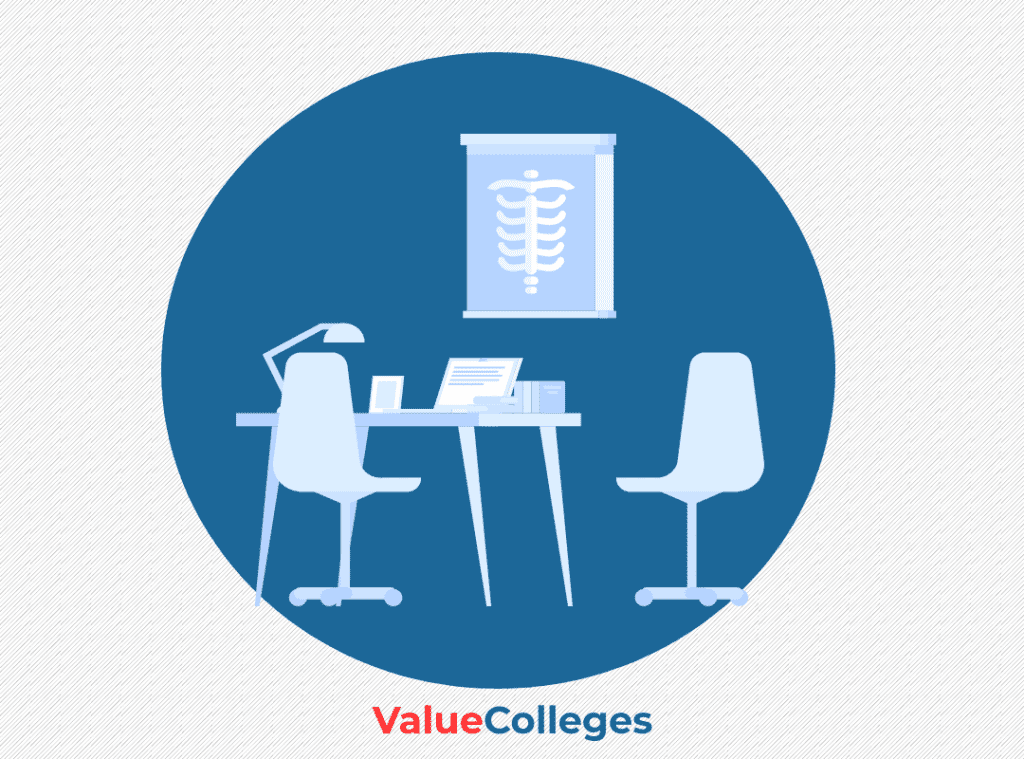25 Careers in Counseling Psychology

Find your perfect value college
Mental health counselors and therapists are educated and trained to help people manage a variety of psychological problems that manifest in many ways throughout each of our lifetimes. Counselors and psychologists with careers in psychology receive specialized training in different types of jobs in psychology that help individuals negotiate family issues, marital strife, or teenagers running amok.
Mental health experts are known professionally as therapists, counselors, psychologists, and even medical doctors who specialize in mental health – psychiatrists. Together, those with careers with a degree in psychology help individuals overcome life’s challenges by helping clients reveal new insights, develop new, more beneficial habits, or create methods by which to reduce life’s inherent stressors.
Featured Programs
Why Should I Choose a Career in Psychology or Counseling?
The reality is, no one individual is immune to life’s stressors and inevitable challenges. So there are times when everyone benefits significantly from speaking with a mental health professional like a counseling psychologist for daily issues that are overwhelming and complicated.
Degrees in counseling and psychology open many career opportunities, especially when you have an innate need to help others in a number of ways. Jobs in psychology and jobs in counseling cover a wide variety of specialties like a family counselor, rehabilitation counselor, substance abuse counselor, mental health, or vocational counselor, to name a few.
Most students in a counseling psychology program earn a foundational degree by obtaining an undergraduate degree in psychology or a related field; however, some professional counseling degrees may require a graduate degree in certain instances. Mental health professionals who earn a doctoral level degree find rewarding careers in the fields of leadership, supervision, and education.
So, if you are wondering what the answer to this general question – What can I do with a degree in psychology? – read on to learn about 25 career pathways in psychology. There are many counseling psychology jobs. Students interested in discovering – What can I do with a degree in psychology if I earn a post-graduate degree, should also consider the options noted below, only with additional responsibilities.

Art Therapist
Those individuals considering jobs for psychology degrees with a focus on art should consider a career path in psychology as an Art Therapist. Art therapy allows clients to express their feelings and themselves creatively – using the many forms of visual (and audio, among others) expression. Art Therapy takes on many forms but seeks to help clients increase their personal insight regarding self-esteem and emotional responsiveness. Art therapy is often viewed as a haven for the expression of intense emotions where words fail.
Traditionally, art therapists employ art media as forms of expression for clients. Certification & licensing requirements may vary from state to state, although many art therapists seek to become a member of the ATCB – the Art Therapy Credentials Board.
Career/Vocational Counselor
A vocational or career counselor is one of those careers with a major in psychology that allows counseling professionals to help guide young adults (or those adults seeking to change careers or re-enter the workforce) through the myriad of complex decisions regarding their education and career objectives. Career counselors are generally well-versed in labor and job markets and how educational opportunities can be integrated to create rewarding career paths in psychology.
The US maintains a credentialing oversight organization in the vocational counseling field known as the NCDA – the National Career Development Association, which offers a variety of professional credentials in the vocational/career counseling field.
Clinical Psychologists
Clinical psychology traces its roots to U Penn’s first clinic devoted to psychology in the late 1800s. Clinical jobs in psychology seek to assist patients by understanding and that hopefully, relieving distress and dysfunction emanating from psychologically related disorders and simple everyday stress. Common types of clinical psychology include transpersonal psychology, existential psychotherapy, or Gestalt therapy, to name a few.
Clinical psychologists with a professional psychology degree are trained to evaluate mental illness and trained to treat a variety of mental health conditions. Counseling psychology programs teach evaluative techniques including personality, intelligence, and neuropsychological testing, plus simple clinical observation. Clinical treatments and interventions used by those on a career path in psychology include four schools of thought/practice – humanistic, family therapy systems, cognitive/behavioral, or psychodynamic models. Counseling psychologists work in community mental health centers, university counseling centers, and other mental health facilities, or in private practice providing mental health services.
Cognitive and Perceptual Psychologists
Cognitive counselors and psychologists offer another of the many career paths in psychology. Cognitive psychologists study human mental processes in-depth and apply techniques drawn from the fields of social, personality, developmental, cognitive, linguistics, and abnormal psychology, among others. The mental processes studied by cognitive/perceptual psychologists delve into those mental processes that impact behaviors and behavioral decisions.
Careers with a degree in psychology that focus on cognitive psychology generally address human mental processing as a dual technique – that of reasoning (the slower of the mental processes because it is subject to judgment at a conscious level) and that of intuition – generally viewed as lightning-fast and nearly automatic. Examples of famous and influential cognitive psychologists include Jean Piaget, Aaron T. Beck, and Eleanor Rosch.

Community Psychologists
Community Psychologists are considered one of the newer paths for careers in psychology, having its initial beginnings traceable to the mid-1900s. Those working as professional community psychologists work within individuals as they seek to manage, health and repair their relationships with the community at large, and even society.
Community Psychologists are trained to assess life’s quality as a function of a group, a community, an organization, or a state. Community psychology professions work closely with other para-mental health professionals. These include social workers, public health officials, and cultural leaders. Community psychologists seek to balance the resources and empower all community members to contribute those projects that serve the community, and thus, all members of the community.
Counseling Psychologists
Jobs in counseling for psychologists offer a specialty that includes both applied clinical work and research-based work. Counselors, to be effective generally have innate or learned skills regarding –
- Empathy – the ability to identify with another’s perspective/experience.
- Communication – communication is a fundamental part of any quality therapy session. A therapist without communication skills will find it overwhelmingly difficult to help their client reframe a chronic lifelong dilemma.
- Listening Skills – therapists must be adept at active listening, which requires them to reflect and reframe client programs to create solutions.
Successful counselors are great jobs in psychology for those who consider themselves to be a people person; with a natural, almost effortless ability to chat with ease and be respectful of others’ boundaries.
Developmental Psychologists
A developmental psychologist is a great career path in psychology for those individuals who have a serious interest in how and why human beings change over time and throughout their lives. While development psychologists were originally focused upon the measurable stages of an infant/small child’s development, developmental psychology now includes a human being’s developmental stages through from infancy through adulthood and onto aging and death.
Developmental psychologists focus primarily on the development of three areas – social/emotional, physical, and cognitive development. Ultimately, these broad categories are further refined to include one’s self-concept, language, executive functions, motor skills, and social identity, among other facets of development. Influential development psychologists from the 1900s include Jean Piaget, Esther Thelen, and Erick Erikson, to name a few.
Educational Psychologists
Educational psychologists work with parents, teachers, and students and are considered one of the primary educational career pathways in psychology. Education psychologists differ from other jobs in counseling in that they specifically work with the dynamic of students/teachers/parents in the formal assessment and intervention of academic techniques to help students overcome a variety of learning disorders like dyslexia, sensory misperceptions, Attention Deficit Disorder children, or Asperger’s Syndrome or another Autistic Spectrum Disorders.
Educational psychologists seek to optimize resources for students, parents, and teachers in the area of psycho-social assessment and development of academic programs and resources that benefit students struggling throughout their early school years, and help prepare these students for future school success by correcting early learning challenges.

Engineering Psychologists
Engineering psychologists is one of those jobs for psychology degrees that studies human behavior, plus the capacity of human behavior with respect to technology and design. Engineering psychology focuses on enhancing the inter-relationship of machines and people and is an offshoot of the slice of the field known as experimental psychology.
Engineering psychology traces its roots back to WWI when American weapons failed in the war because of human error. One of the first applications of engineering psychology was the task to mitigate noise levels for those workers constructing military aircraft. However, in the mid-1940’s mother and engineer, Lillian Gilbreth began studying time and motion, inventing helpful kitchen mechanics like the pedal step garbage can.
Environmental Psychologists
Environmental psychology began in the mid to late 1960s, when scientists realized the direct connection between human choices and the natural (and man-made) environments in which humans reside. In terms of environmental psychologists as a career path in psychology, students interested in this work seek to solve complicated environmental issues while ensuring the well-being of individuals and society overall.
Environmental psychologists apply their talents with skills pulled from a variety of professional disciplines like social ecology, architectural psychology, behavioral geography, and ecopsychology, to name just a few. Psychologists combatting environmental issues approach these large-scale problems from two perspectives – a problem-oriented approach and a systems-oriented approach. Environmental psychologists recognized that environmental cognition and human cognition are closely related, with all parts of the brain involved in being environmentally conscious.
Evolutionary Psychologists
Evolutionary psychologists seek to theoretical understand how the human condition adapts over time from the evolutionary perspective of natural selection. Evolutionary psychologists believe that the human mind psychologically adapts in similar ways to the human body. The theories founded by evolutionary psychologists are adapted and applied to the field of health, law, environment, economics, politics, and even literature.
Proponents of evolutionary psychologists believe that human nature (and the recurring problems faced by human beings) are psychological adaptions to natural surroundings and related sciences. Evolutionary psychologists work from several fundamental principles that include the human brain is a processing device; the brain is adaptable, the brain is a problem-solving mechanism, and parts of the brain operate unconsciously.

Experimental Psychologists
Experimental psychologists are the professionals who apply psychological processes and experimental methods to determine underlying causes and behaviors. Experimental psychologists are great careers in psychology for those who are interested in the study and experimentation of many areas related to human functioning, including memory, motivation, perception, cognition, emotion, and developmental processes.
As a scientific process, experimental psychologists must abide by essential psychological science assumptions that include –
- Determinism – the state of the object is determined by its prior state.
- Empiricism – facts must be observations of the world.
- Parsimony – the guidance that requires simplicity when possible.
- Testability – if a theory is not testable, the theory is essentially meaningless.
Certain areas of psychology employ experimental psychology techniques. These include cognitive psychology, social psychology, and behavioral psychology, to name a few.
Family/Marriage Counselor
A marriage or family counselor is a specialized professional in the facet of the field of psychotherapy that focuses on the intimate relationships that happen between members of a family. Although the definition of ‘family’ was once much narrower, family therapy theorists now include the dynamics of members of both extended and nuclear families, which makes it one of the more interesting jobs in counseling.
Marriage and family counselors (or marriage and family therapists) employ a number of psychological techniques and treatments that effectively treat the many issue and problems that arise between and among family members. The number of sessions that would be needed to appropriately manage/resolve issues at hand depends on the family and the complexity of the problems and the interrelationship of family members. Influential founders of this facet of psychology include Alfred Adler, Nathan Ackerman, and Sue Johnson.
Forensic Psychologists
The field of forensic psychology is a recognized sub-specialty of psychology that deals specifically with how the principles and applications of psychology can be used to help enforce criminal and civil proceedings. Forensic psychology had become such a valuable facet of the fields of law and psychology, that in 2015, the APA – the American Psychological Association defined forensic psychology as the subfield that applies the specialized/technical information of psychology to the field and the participants in the legal field.
It is noted that legal psychology does not generally include the application of clinical techniques, but operates more from a theoretical perspective. As such, forensic psychologists perform as trial consultants or expert witnesses, for those psychological issues that manifest for parties to a lawsuit, or in understanding how juries respond during witness testimony.
Genetic Counselor
Genetic counseling is a specialized type of psychologist/therapist job that helps guide couples interested in starting a family about the risks of known genetic issues. A genetic counselor is considered one of the career paths in psychology that began in the mid-1940s. Genetic counseling is a phrase that was coined by Sheldon Reed. Genetic counselors offer specialty care in the areas of –
- Pre-conception
- Pre-natal
- Cancer
- Pediatric
- Cardiovascular
- Neurologic, among others
A genetic counselor advises clients by educating them regarding available medical resources and testing, interpreting medical histories, and helping guide clients to make the best most educated decisions regarding genetic risks and vulnerabilities.

Health Psychologists
Health psychology is the study of behaviors & cultural factors that impact the delivery and receipt of health care and healthcare treatments. In terms of behavior, health psychologists work with human behaviors that, across time, will be harmful to the individual. These behaviors managed by those with a career with a degree in psychology focused on health include overeating, sex addiction, drug addiction, alcoholism, or gambling addiction, to name a few.
Health Psychologists utilize a combination approach when treating patients as they acknowledge that behaviors emanated from biologic processes (like a virus, etc.), but also social processes and psychological processes – like beliefs and thoughts. A health psychologist works in a variety of healthcare settings like clinics, health promotion, the government, medical schools, research facilities, or institutions of higher education.
Industrial/Organizational Psychologists
An organizational psychologist (which is also known as an industrial psychologist) applies the principles of individual behavior, group dynamics, and human choices within a professional organization or place of work. Industrial psychologists apply scientific theories to manage human behavior that ultimately will improve a company’s success, but also employ job satisfaction, overall attitudes, and health/well-being.
Industrial Organization (IO) psychology is an officially recognized subspecialty (Div. 14) of the APA – the American Psychological Association. IO psychologists, as one of the many jobs in psychology with great potential, are tasked with comprehensively analyzing jobs, helping manage personnel recruitment, managing workplace aggression/bullying, occupational health, training and implementing performance evaluations, and psychometrics, to name a few.
Neuropsychologists (& Behavioral Neuropsychologists)
Neuropsychology is a significant branch of the psychology sector that focuses specifically on how the human nervous system (and the brain/brainstem) impacts how a person behaves and how their cognition is organized to impact their behavioral choices. Neuropsychologists are both researchers – involved in the experimentation phases and clinicians – working daily with patients applying proven techniques to improve the quality of lives for their patients.
Neuropsychology is considered one of the newer psychological disciplines, with the first textbook only published in the early 1980s, although some claim its roots can be traced to ancient Egypt. Clinical neuropsychology allows experts to apply existing neuropsychological knowledge and treatment to help rehabilitate those who have suffered an injury/illness.
Psychometrist
A psychometrist is a psychological specialty that is primarily focused on studying the existing theories and techniques that quantify and measure psychological factors. These objective psychological measurements are known by NCME – the National Council on Measurement in Education, as psychometrics. Many psychometrists choose to specialize in the construction of valid assessment and tests, while other professional psychometrists work within the application of measurement theories, like intraclass correlation, etc.)
Historically, the measurement of human behaviors (i.e., differences) can be traced back to Charles Darwin in the mid-1850s, who was ultimately influenced Sir F Galton, the creator of psychometrics, written in the book Hereditary Genius. The first psychometric measurement was the creation of the intelligence quotient test – the Stanford-Binet IQ exam.
Quantitative and Measurement Psychologists
The field of quantitative/measurement psychology is, like psychometrics, especially related to statistical modeling of human (and often, animal) processes. Quantitative psychologists are great jobs for psychology degree holders who prefer to use statistical and mathematical analyses in solving complex problems from a theoretical and applied perspective.
The field of quantitative/measurement psychology was an offshoot from the early field of experimental psychology when scientific methodologies were first applied to psychological studies and testing models. As the power of computers has exploded exponentially, so has the statistical analysis powers of quantitative psychology. In fact, until the power of computers, the statistical patterns revealed in this specialty were not possible due to the limitations of the mind’s abilities to calculate as fast as a computer.
Rehabilitation Psychologists
A rehabilitation psychologist is one of those specialty careers with a major in psychology that offers great satisfaction for those individuals who wish to help others regain their independence – in a number of ways when they are faced with an injury, disability, or chronic health disorder. Rehabilitation psychologists support clients as they regain their ADLs, cognitive and psychosocial functions to optimize the client’s quality of life.
A rehabilitation psychologist works in a variety of health care settings from inpatient facilities, hospitals, community centers, acute care facilities, and long-term care centers, to name a few. A rehabilitation psychologist is generally an essential part of a patient’s health care team and works along with doctors, nurses, physical therapists, and occupational therapists, among others.
School Psychologists /Counselors
A school psychologist works within the confines of a school setting. School counselors apply principles from several fields of psychology, including educational psychology, developmental psychology, community psychology, and clinical psychology, among others. However, school psychologists receive specialized training in child and adolescent development and psychopathology as well.
Another of a school counselor’s professional responsibilities includes the administering of standardized testing each year, including the legal and ethical boundaries to be followed as set forth by the test administrators. School counselors tend to need a minimum of a graduate-level degree to meet employment qualifications.
Social Psychologists
Social Psychologists work with the behaviors, thoughts, and feelings of clients – whether they are imagined thoughts/feelings, or real. Social psychologists work with and measure the psychological variables in humans that are expressed and manifested as feelings, desires, wants, and thoughts.
Social psychologists help clients make the connection as to how human behavior is the result of the interaction between social situations and one’s mental state. Although there are historical mentions by an Islamic philosopher, social psychology is generally recognized to have begun in the early twentieth century. Social scientists and psychologists study attitudes and how they change over time.
Sport Psychologists
A sports psychologist is a psychological specialist with additional training in the fields of –
- Physiology
- Bio-mechanics
- Kinesiology
- Psychology
Together, these subspecialties provide a sports psychologist with the skills and talents to manage and treat those psychological factors that influence an athlete’s participation and, ultimately, their performance. The first sports psychological, Coleman Griffith, began working in this field in the mid-1920s.
Sports psychologists, as prudent career paths in psychology, generally choose to work as clinicians – working directly with athletes both individually and in groups, or as educational sports counselors.
Substance Abuse Counselor
A substance abuse counselor is a professional counselor with specific training in drug and substance abuse. Because of the overwhelming drug crisis in the United States, there are many substance abuse counselor jobs in counseling throughout the country.
Substance abuse counselors use a variety of treatment methods to help recovering addicts stay clean as they navigate the treacherous psychological waters that often lead to substance abuse. A substance abuse counselor is trained to work with individuals addicted to heroin, opioids, marijuana, methamphetamine, alcohol, and cocaine, to name just a few.
Related Rankings:
Most Affordable Online Psychology Bachelor’s Programs
25 Most Affordable Online Master’s in Psychology
Most Affordable Online Master’s in Counseling Degree Programs
Featured Programs
Aya Andrews
Editor-in-Chief
Aya Andrews is a passionate educator and mother of two, with a diverse background that has shaped her approach to teaching and learning. Born in Metro Manila, she now calls San Diego home and is proud to be a Filipino-American. Aya earned her Masters degree in Education from San Diego State University, where she focused on developing innovative teaching methods to engage and inspire students.
Prior to her work in education, Aya spent several years as a continuing education consultant for KPMG, where she honed her skills in project management and client relations. She brings this same level of professionalism and expertise to her work as an educator, where she is committed to helping each of her students achieve their full potential.
In addition to her work as an educator, Aya is a devoted mother who is passionate about creating a nurturing and supportive home environment for her children. She is an active member of her community, volunteering her time and resources to support local schools and organizations. Aya is also an avid traveler, and loves to explore new cultures and cuisines with her family.
With a deep commitment to education and a passion for helping others succeed, Aya is a true inspiration to those around her. Her dedication to her craft, her community, and her family is a testament to her unwavering commitment to excellence in all aspects of her life.